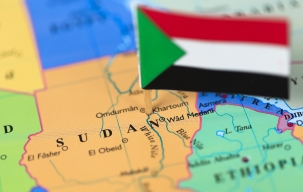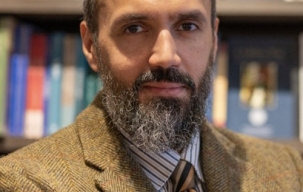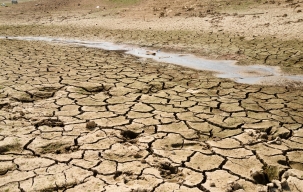Key dates
Latest
-

-
PodcastsDefence & Security — 27 Feb 2025
MENA under a Trump Presidency - What next? with Dr. H.A. Hellyer
 Members content
Members content -
 Members content
Members content

Khartoum
39.5 million
In April 2023, armed conflict between rivals began for control over Sudan.
The political situation was uncertain and unstable following the military coup of October 25th 2021, and subsequent resignation of civilian prime minister in January 2022 over failure of pact with military. There had been joint civilian-military rule since a previous coup in 2019.
General Abdel Fattah al-Burhan as President
Acting Prime Minister Osman Hussein
January 1st
H.E Mr Mohamed Abdalla Idris Mohamed
Embassy of the Republic of the Sudan, 3 Cleveland Row, London, SW1A 1DD
H.E Mr Giles Lever
British Embassy Khartoum, off Sharia Al Baladiya, Khartoum, PO Box No 801, Sudan
*April 2023 - The embassy has been temporarily closed due to the on-going conflict. The Ambassador and staff have relocated to Addis Ababa in Ethiopia to lead the UK’s diplomatic efforts in the region to bring fighting to an end in Sudan.
The Republic of Sudan (North)
Civil war between the north and the south began a year before Sudan gained independence in 1956 and it raged on and off for the next half century. The two halves of the country finally went their separate ways in 2011. Post-independence Sudan has been an extremely turbulent, with wars, military coups and revolutions.
In reality the two Sudans began to diverge long before independence in 1956 under British colonial policy towards the country, concentrating development in the Arab north while ignoring the Black African south which lacked basic infrastructure such as roads, schools and hospitals.
After independence, the Khartoum government in the north was often accused of the same neglect, and this helped foster the resentment that led to Africa's longest-even war of the 20th century. Fifty years of on-off conflict is thought to have cost the lives of approximately two million people.
The north and crimes against Darfur
Conflict and alleged genocide in the western region of Darfur has kept the Republic of Sudan in the news headlines for all the wrong reasons over the last decade or so. In early 2003, two rebel movements accused the Sudanese government of oppressing Non-Arab Darfurian people and began an insurgency. The government fought back by carrying out a campaign of ethnic cleansing against Darfur’s non-Arab peoples.
In March 2009, the International Criminal Court issued an arrest warrant for President Omar Bashir on charges of war crimes and crimes against humanity; a year later the ICC issued a second arrest warrant on charges of genocide for massacres committed by the pro-government Janjaweed militias. An estimated 200,000 to 400,000 Darfurians are said to have been murdered. However, in 2014, the ICC halted investigations into Darfur war crimes for lack of support from the UN Security Council.
The 2018 Revolution and the fall of al-Bashir
In December 2018, mass protests began, principally over the government's decision to triple the price of food when inflation was already running at 70 per cent. President al-Bashir refused to end to his 30 years reign and this inevitably led to a powerful coalition of divergent groups in opposition.
The spark for the 2018 revolution occurred amidst an economic crisis which had its roots in the 2011 independence of South Sudan. When South Sudan seceded, it took with it 75% of Sudan's oil fields with it.
Revenues from this oil had been the main driver of Sudan’s economic recovery during the years that followed the Comprehensive Peace Agreement of 2005 between Omar al-Bashir’s government in Khartoum and the southern Sudanese rebel movement, the Sudan People’s Liberation Movement (SPLM). This agreement ended years of civil conflict.
In April 2019, the country's military chiefs of staff ordered the arrest of al-Bashir and declared a state of emergency. A new government led by Prime Minister Abdalla Hamdok followed the signing of a power-sharing agreement between military and civilian authorities.
Supporters of al-Bashir were said to be behind a failed coup attempt in September 2021.
Military coup October 2021
Army general Abdel Fattah al-Burhan staged a successful military coup on October 25th 2021, and detained the prime minister Abdalla Hamdok, other government ministers and civil society leaders. It was the fourth coup in post-independence Sudan. The take-over was condemned by governments world-wide and led to public sector strikes and large street protests. Within a month, on November 21st, the coup-leaders restored Hamdok to power as prime minister and signed a 14 point deal, leading to the release of political prisoners and agreement for a transition based on the 2019 power sharing agreement.
However, in January 2022, Hamdok resigned after apparently accusing the military of reneging on the non-interference pact. In a televised address, he said he had tried to stop the country from "sliding to disaster." Both the EU and US have warned the Sudanese military against unilaterally appointing a new prime minister and government.
Armed civil conflict breaks out in April 2023
In April 2023, the Rapid Support Forces (RSF) militia under warlord Mohamed Hamdan "Hemedti" Dagalo began a coup attempt against the Sudanese Armed Forces (SAF) under General Abdel Fattah al-Burhan. It has led to violent battles that quickly caused hundreds of deaths and threatens the outbreak of civil war. As of May 2023, it was described as " burgeoning civil war."
The RSF grew out of and is mainly comprised of the Janjaweeed, the militias that have been accused of war crimes in Darfur and elsewhere. (See above.)
The Republic of South Sudan
South Sudan gained independence on July 9th, 2011, as the result of a 2005 agreement that ended Africa’s long-running war, between the Muslim north and largely Christian south. That intermittent conflict lasted half a century and left up to 2 million people dead.
South Sudan is constituted of ten of the southern most states of Sudan and its capital is Juba. Its hard-won independence did not bring an end to conflict.
Civil war in the south
In 2013, just two years after South Sunday won its independence, civil war broke following a bitter dispute between the president, Salva Kiir Mayardit, and his vice-president, Riek Machar. The brutal 5-year conflict left 400,000 people dead and fuelled Africa’s biggest refugee crisis since the Rwandan Genocide of 1994. In 2018, the war parties reached an uneasy peace by signing a power-sharing agreement. The conflict and ensuing famine have left 8 million people, around two thirds of the entire population of South Sudan, in need of humanitarian aid.


